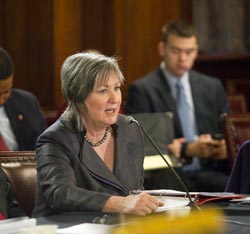President Hart stands up for Temple at House hearing
President Ann Weaver Hart and the three other state-related university presidents made their case in Harrisburg on Monday for Commonwealth support for higher education before the House Appropriations Committee. The hearing was the latest step in the Commonwealth budget process that began with Gov. Tom Corbett proposing a more than 50 percent cut to Temple’s appropriation.
Speaking in a packed hearing room, President Hart said she understands the challenge facing legislators as they attempt to close a $4 billion budget gap. The governor's proposal being reviewed by legislators would reduce the Commonwealth appropriation to Temple by more than half.
"We understand the challenges you face and we want to be part of the solution," she said, noting that that the decisions elected officials make will have a direct effect on the lives of individuals. "I also want you to know this is very personal for me. I would not be here if it wasn't for a publicly supported higher education."
Legislators asked a range of questions during the hearing, such as how universities used the federal stimulus funding and what value the Commonwealth gets from having a group of state-related universities.
On the topic of federal stimulus funds, President Hart explained that Temple officials knew those dollars were not going to last. "We used stimulus dollars for one-time expenses targeted to academic development," she explained. "We did not put them into the operating budget."
Temple's impact on the Commonwealth is clear: The university directly employs nearly 7,500 Commonwealth residents, and in the last seven years, Temple capital projects provided 14,000 jobs in construction and related services for the state. The president told legislators that Temple University and the Temple Health System account for $5.3 billion of economic activity across Pennsylvania annually.
In addition, Pennsylvania students attending Temple pay a lower tuition than out-of-state students. Hart also noted that the private schools in the Philadelphia region charge Pennsylvania students between two and three times as much in tuition, compared with Temple's in-state tuition rates.
Hart also made the point that cuts in the welfare budget would have an additional negative impact. She said the Temple University Hospital is the largest safety net hospital for providing health care to underserved populations in Philadelphia. As federal and state reimbursement support for that care continues to decline, Temple finds itself "squeezed from both ends" and will have to make difficult decisions about health care.
Temple and the presidents of Lincoln, Penn State and Pitt have now appeared before appropriations committee members for both the Senate and the House. While this stage of the General Assembly's process is complete, legislators will continue to debate budget priorities and Temple's efforts to communicate the importance of higher education will continue.
For additional updates on the university's budget status, go to Temple's Government Affairs homepage, and sign up to become part of Temple Advocates Legislative Outreach Network (TALON).
